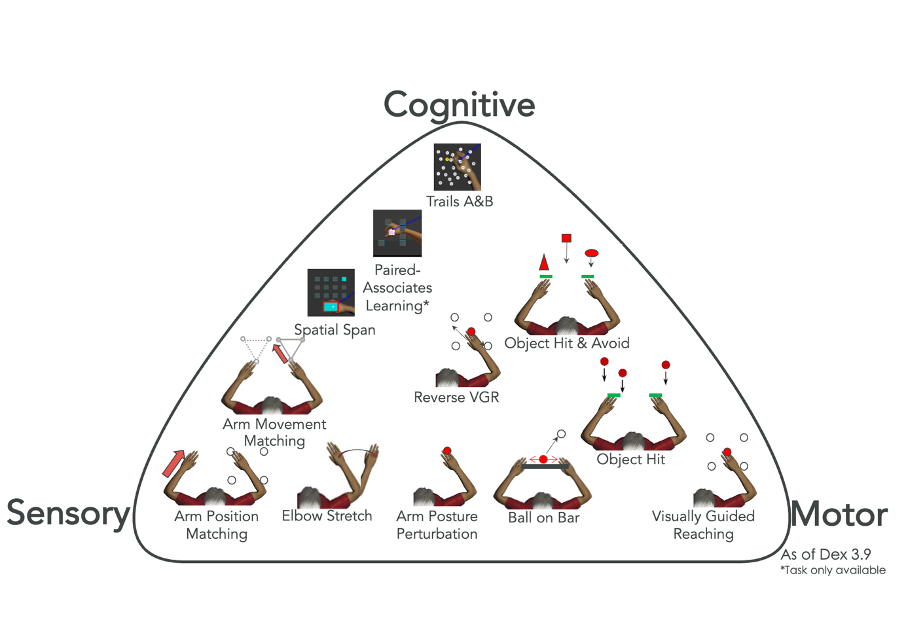Our goal is to explore how interactive robotics can be used as a next generation technology to quantify brain function and dysfunction. We have developed a large battery of behavioural tasks with associated automated analysis algorithms that can be run on the Kinarm robotic systems to assess sensory, motor and cognitive functions. We continue to develop advanced analysis techniques and expand the suite of behavioural tasks to assess brain function.
Use Kinarm labs for your research program
Our facilities at Queen’s University and associated hospitals (Providence Care Hospital, Kingston General Hospital and Hotel Dieu Hospital) are available for researchers to explore how diseases or injury impact sensory, motor and cognitive functions. Our experienced staff can assist you in conducting your own Kinarm study. If you have an idea for a study and don't know where to start, contact Dr. Scott.

We offer demonstrations of the Kinarm robot and Dexterit-E, the data collection and analysis software. Kinarm Standard Tests are designed to assess various upper limb sensory and motor functions as well as cognitive function. We can suggest the appropriate set of tasks to address your research question.
Kinarm operators are available to run the robot and administer clinical assessments. We also offer training for new Kinarm operators if you wish to collect your own data. For clinical tests, we have three operators, one of whom is a physiotherapist e.g. if patients require additional assistance. The robots are available for use at all hours. If you require an operator, they are available Monday to Friday from 7:30am - 4:00pm. Other arrangements can be made in advance, depending on the requirements of the study.
Patient populations studied in our clinical projects include:
- Stroke and Transient Ischemic Attack (TIA)
- Migraine
- Shoulder Replacement
- Parkinson’s disease
- Concussion
- Kidney Disease
- Critical Illness (post ICU)
- Cardiac Surgery
- Amyotrophic Lateral Sclerosis (ALS)
- Cerebral Palsy
- Fetal Alcohol Spectrum Disorder (FASD)
- Child Development
- Major Surgery
- Neurosurgery
- Spinal Cord Injury and/or Traumatic Brain Injury
- Epilepsy
- Multiple Sclerosis
- Brain Tumour
- Alzheimer’s
This work is supported by Canadian Institutes of Health Research (CIHR) and Ontario Research Fund (ORF)
Finn S, Aliyianis T, Beattie B, Boissé Lomax L, Shukla G, Scott SH, Winston GP. (2024) Robotic assessment of sensorimotor and cognitive deficits in patients with temporal lobe epilepsy, Epilepsy & Behavior, Volume 151, 109613, ISSN 1525-5050, DOI: 10.1016/j.yebeh.2023.109613.
Park K, Ritsma BR, Dukelow SP, Scott SH. A robot-based interception task to quantify upper limb impairments in proprioceptive and visual feedback after stroke. J Neuroeng Rehabil. 2023 Oct 11;20(1):137. doi: 10.1186/s12984-023-01262-0. PMID: 37821970; PMCID: PMC10568927.
Jawa NA, Silver SA, Holden RM, Scott, SH, et al. Neurological Impairment in Critically Ill Patients on Dialysis: Research Letter for the INCOGNITO-AKI Feasibility Study. Canadian Journal of Kidney Health and Disease. 2023;10. doi:10.1177/20543581231192743
Gaprielian P, Scott SH, & Levy R. (2022). Reverse Visually Guided Reaching in Patients with Parkinson’s Disease. Parkinson's Disease, 2022, e8132923. DOI:10.1155/2022/8132923
Semrau JS, Scott SH, Hamilton AG, Petsikas D, Payne DM, Bisleri G, Saha T, & Boyd JG. (2022). Quantifying neurological function in patients undergoing transcatheter aortic valve implantation. Cerebral Circulation - Cognition and Behavior, 3, 100137. DOI:10.1016/j.cccb.2022.100137
Vanderlinden JA, Semrau JS, Silver SA, Holden RM, Scott SH, & Boyd JG (2022). Acute kidney injury is associated with subtle but quantifiable neurocognitive impairments. Nephrology Dialysis Transplantation, 37(2), 285–297. DOI: 10.1093/ndt/gfab161
Simmatis, L.E.S., Scott, S.H. and Jin, A.Y. (2021) Quantifying changes over 1 year in motor and cognitive skill after transient ischemic attack (TIA). Scientific Reports 11: 1-12.
Lowrey, C., Blazevzki, B., Marnet, J.-L., Bretzke, H., Dukelow, S.P. and Scott S.H. (2020) Robotic tests for position sense and movement discrimination in the upper limb reveal that they each are highly reproducible but not correlated in healthy individuals. Journal of Neuroengineering and Rehabilitation 17:103.
Simmatis, L.E.R., Early, S., Moore, K.D., Appaqaq, S. and Scott, S.H. (2020) Statistical measures of motor, sensory and cognitive performance across repeated robot-based testing. Journal of NeuroEngineering and Rehabilitation 17:86.
Simmatis, L., Jin, L., Taylor, S., Bisson, E., Scott, S.H. and Baharnoori, M. (2020) The feasibility of assessing cognitive and motor function in multiple sclerosis patients using robotics. Multiple Sclerosis Journal 6(4):205517320964940.
Simmatis, L.E.R., Jin, A.Y., Keiski, M., Lomax, L.B., Scott, S.H. and Winston, G.P. (2020) Assessing various sensorimotor and cognitive functions in people with epilepsy is feasible with robotics. Epilepsy & Behavior 106859.
Lowrey, C.R., Bourke, T.C., Bagg, S.D., Dukelow, S.P. and Scott, S.H. (2019) A postural unloading task to assess fast corrective responses in the upper limb following stroke. Journal of Neuroengineering and Rehabilitation 16, 16.